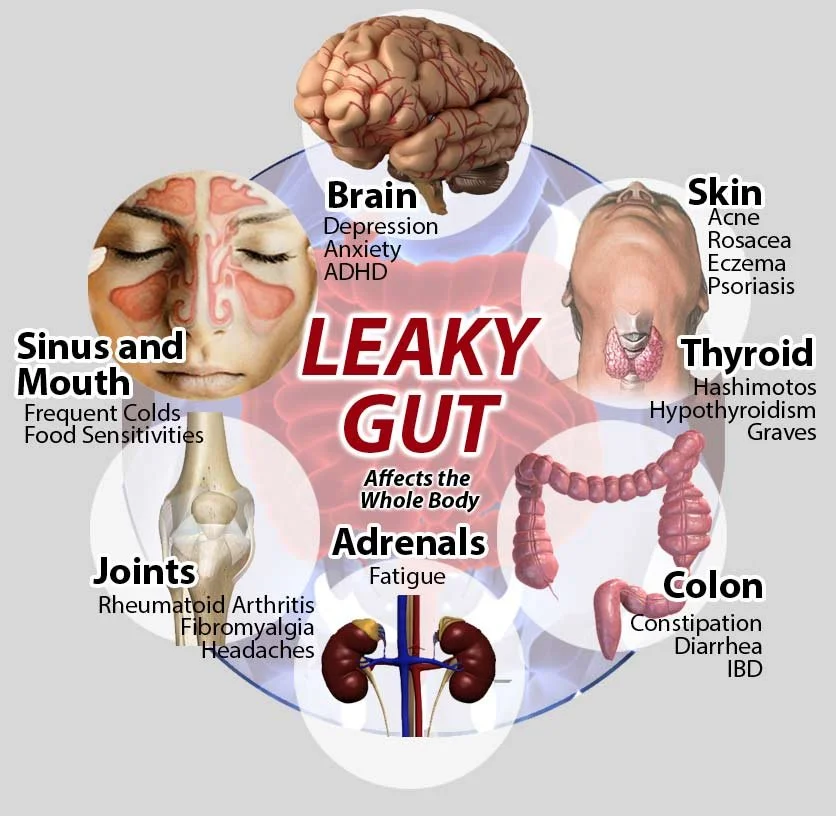Understanding Leaky Gut Syndrome: How to Recognize and Restore Gut Health
Leaky Gut Syndrome is a condition in which the intestinal walls become excessively permeable, allowing not only nutrients but also toxins, microbes, and undigested food particles to enter the bloodstream. This can trigger inflammation and impair the immune system, which in turn lead to various chronic diseases. Let’s take a closer look at the causes, symptoms, risks, and treatment methods for this condition.
Causes of Leaky Gut Syndrome
The primary causes of leaky gut syndrome include:
1. Poor Diet– Excess sugar, refined carbohydrates, gluten, processed foods, and preservatives disrupt bacterial balance and irritate the intestinal lining.
2. Stress– Chronic stress weakens the immune system and increases inflammation levels.
3. Medications– Certain antibiotics, NSAIDs (nonsteroidal anti-inflammatory drugs), and steroids can damage the intestinal walls.
4. Infections and Dysbiosis– Imbalances in gut microbiota and infections affect intestinal permeability.
5. Hormonal Imbalances– Hormone imbalances, especially cortisol, also impact the integrity of the gut lining.
Symptoms of Leaky Gut Syndrome
Symptoms can be highly varied, often making diagnosis challenging:
- Bloating, gas, and other digestive issues
- Persistent fatigue and weakness
- Headaches and migraines
- Joint and muscle pain
- Allergic reactions and food intolerances
- Skin issues (acne, eczema)
- Weakened immunity, frequent colds
- Mood disturbances, anxiety, depression
Risks Associated with Leaky Gut Syndrome
If left untreated, this condition can lead to complications, such as:
- Autoimmune Diseases– For example, rheumatoid arthritis, Crohn’s disease, and celiac disease.
- Chronic Inflammatory Processes– Increased gut permeability fuels inflammation in the body, raising the risk of cardiovascular diseases.
- Atopic Reactions– Increased tendency for allergic reactions, such as eczema, asthma, and food allergies.
- Hormonal Imbalance– Including insulin resistance, which raises the risk of developing diabetes.
Treatment of Leaky Gut Syndrome
Bio-resonance therapy is a method aimed at restoring the normal functioning of the body at the cellular vibration level. For leaky gut treatment, bio-resonance help reduce inflammation, improve microbiota balance, and accelerate the regeneration of damaged tissues.
Proper nutrition is a cornerstone of gut health restoration:
- Avoid Irritating Foods and drinking water during meal : Exclude gluten, sugar, dairy, and processed foods.
- Antioxidants and Probiotics: Include berries, vegetables, and fermented foods (like sauerkraut, no sugar yogurt), which support healthy microbiota.
- Fiber-rich Foods: Help cleanse the gut and improve its motility (vegetables, seeds, greens).
- Bone Broth and Gelatin: These foods contain collagen and amino acids that help repair the gut lining.
Herbs play an essential role in gut repair:
- Licorice Root – Helps protect the intestinal lining and reduce inflammation.
- Aloe Vera– Has a soothing and regenerative effect.
- Turmeric– A powerful antioxidant with anti-inflammatory properties.
- L-Glutamine– An amino acid that helps restore the intestinal lining.
4. Homeopathy
Homeopathic remedies can be helpful in supporting the overall balance and well-being of the body. For example, Nux Vomica helps with digestion issues caused by stress and poor diet, while Arsenicum Album can assist with gastrointestinal disturbances and weakness.
Conclusion
Leaky gut syndrome requires a comprehensive approach to treatment. It is essential not only to manage symptoms but to address root causes, restore body balance, and strengthen the body’s defenses. A combination of bio-resonance therapy, proper nutrition, herbs, and homeopathy can provide lasting results and help restore health.
